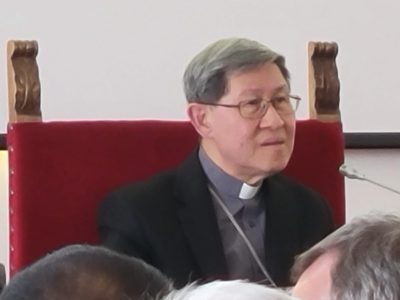Inviting Everyone To The Banquet: Cardinal Tagle’s Message To The Pontifical Mission Societies
Faced with a waning interest in the Church in many parts of the world, Cardinal Tagle emphasized that the solution is not to “cancel the banquet,” but to “go out to invite everyone.”

The mission of the Church is to “go out” to the world’s crossroads and “invite everyone” to a feast. This is the essence of the message Cardinal Luis Antonio Tagle delivered to the 120 National Directors of The Pontifical Mission Societies. The Pro-Prefect of the Dicastery for Evangelization spoke during the ongoing General Assembly in Sacrofano, on the outskirts of Rome.
In his impromptu address, partially presented by Fides, Cardinal Tagle drew inspiration from the parable of the wedding banquet in the Gospel of Matthew, a narrative echoed in Pope Francis’ message for World Mission Sunday 2024.
Read Pope Francis’ message to the General Assembly
Reflecting on the parable, Cardinal Tagle recounted how the king sent his servants to invite guests to his son’s wedding banquet, but they refused to come. Some even mistreated and killed the servants. The king then ordered his servants to go out again and invite everyone they found at the crossroads.
Cardinal Tagle emphasized, quoting Pope Francis, that the Church is called to go out and “invite people to a banquet. Invite, not force, not coerce people to come. Our preaching, our prayer, our sacramental life, our charity work, our relationships, our testimony, all of this must be an invitation to come, addressed to everyone.”
The Cardinal further highlighted the importance of presenting the Gospel as something inviting. “The banquet to which everyone is invited,” he continued, “should be presented as something inviting, something attractive.” He recalled Pope Benedict XVI’s words, “faith grows by attraction, not by coercion,” and asked, “Do we present the Gospel as God’s feast with humanity? Do we present the banquet as attractive?”
Sharing a personal anecdote, Cardinal Tagle said, “When I was still a bishop in Manila, a very bright and courageous woman told me, ‘Your Eminence, I go to Mass every day, and there the Gospel of the good news is proclaimed. But when the preacher starts to explain, the ‘good news’ becomes ‘bad news.’ Good news, in the hands of certain people, becomes bad news. And how can we invite people to the banquet when the good news loses its flavor?’”
Cardinal Tagle acknowledged the waning interest in the Church in many parts of the world, particularly among young people who no longer feel a vital connection to the faith. Faced with this scenario, he emphasized that the solution is not to “cancel the banquet,” but to “go out to invite everyone,” moving beyond the habit of only addressing those already involved in the Church’s apostolic work or expecting people to come to where we are.
Cardinal Tagle likened the Pontifical Mission Societies to the servants in the Gospel parable, called to seek guests for the banquet in every path of life. Their apostolic work must reach out to “everyone,” not just the “committed Catholics,” but all people in the fabric of their ordinary lives.
The General Assembly, he noted, provides an opportunity to “review our structures and methodologies. We can learn from each other, and perhaps humbly ask ourselves: do our structures, operations, and ways of doing things promote ‘going out to invite’?”
Cardinal Tagle also highlighted various groups to consider for expanding the action horizon of the Pontifical Mission Societies. He mentioned young “influencers” he met at World Youth Day in Lisbon, artists involved in the pastoral initiatives of the diocese of Manila, and Filipino immigrants working abroad who bring their faith into the homes and families they serve.
“Without needing to create a new ‘Missionary Work,’” Cardinal Tagle suggested, “perhaps attention could be given to these ‘new invitees,’ these new groups that could promote the mission of inviting others to the wedding banquet.” He reiterated that all activities of the Pontifical Mission Societies and all ecclesial activities “can become an invitation to the banquet.” Always remembering that the invitation is not an initiative of the Church’s people or its works, but “it is the Father who has invited everyone to the banquet.”
